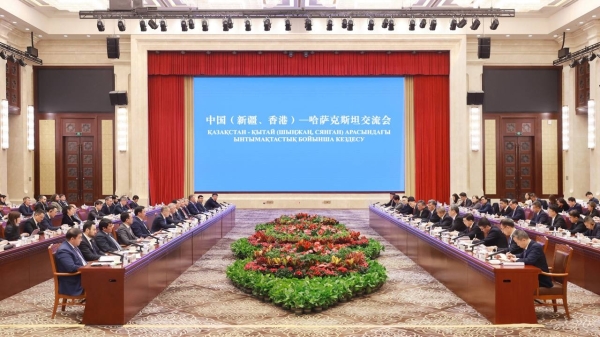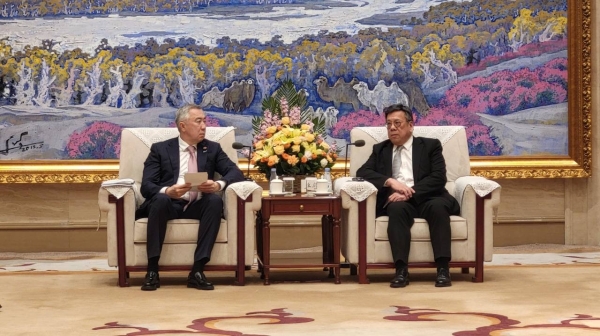A trilateral meeting in Urumqi brought together Kazakhstan, the Xinjiang Uygur Autonomous Region, and Hong Kong to strengthen cooperation. The discussions, led by Kazakhstan’s Vice Prime Minister Serik Zhumangarin, Secretary of the Xinjiang Uygur Autonomous Region Party Committee Ma Xingrui, and Hong Kong’s Secretary for Commerce and Economic Development Algernon Yau, focused on enhancing trade, investment, logistics, and cultural exchanges.

The initiative was first proposed by Ma Xingrui during a bilateral meeting with Zhumangarin in June, setting the stage for this high-level trilateral dialogue. As Ma highlighted during the meeting, Xinjiang is well-positioned to act as a vital bridge connecting Kazakhstan to two key Chinese regions, which are crucial to the success of the “One Belt, One Road” initiative.
“Kazakhstan is an essential transport hub linking Europe and Asia, and Hong Kong is a leading trade and logistics center with strong backing from mainland China. Together, we can create a mechanism for strategic cooperation that will boost investment, enhance logistics efficiency, and foster growth in sectors like finance, agriculture, energy, education, and tourism,” said Ma.
Vice Prime Minister Zhumangarin emphasized the opportunities presented by the trilateral cooperation. He pointed out that China is already a major investor in Kazakhstan, with over 145 projects worth more than $38bn. He also proposed the creation of a Kazakhstan-XUAR-Hong Kong Cooperation Council to facilitate specific investment and trade proposals, with the first meeting scheduled to take place in Kazakhstan next year.
In terms of future collaboration, Zhumangarin suggested the establishment of joint production facilities, particularly in Kazakhstan’s agricultural sector, focusing on the deep processing of grain and oilseed products. He also proposed the creation of a Joint Investment Fund, which would be based in either Urumqi or Hong Kong, to finance joint projects across the regions.

The trilateral discussions also emphasized sustainable agricultural practices, with plans for a joint research center in Kazakhstan to develop high-yield crop varieties and environmentally friendly products. Kazakhstan’s agricultural exports are growing, and the country sees significant potential in exporting processed food products to Hong Kong and the Greater Bay Area.
Tourism was another area of focus, with Ma Xingrui proposing the development of joint tourist routes. These would allow tourists from Hong Kong to visit both Kazakhstan and Xinjiang in a single trip. Additionally, regular transport routes between Kazakhstan, Xinjiang, and Hong Kong would be established to facilitate travel.
Algernon Yau, the Hong Kong Secretary for Commerce and Economic Development, emphasized Hong Kong’s status as a global financial hub and its connectivity to over 200 destinations worldwide. He expressed Hong Kong’s commitment to supporting Kazakh companies through its extensive trade networks, especially within the Greater Bay Area.
Yau also expressed hopes for a swift conclusion of an agreement on the Promotion and Mutual Protection of Investments between Hong Kong and Kazakhstan. Zhumangarin assured that the Kazakh government is actively working on this document.
The trilateral dialogue also touched on expanding digital and e-commerce cooperation, with Kazakhstan keen to engage with Hong Kong’s expertise in the sector.
“We are interested in the experience of the Hong Kong Stock Exchange and look forward to collaborating on the Digital Silk Road initiative,” Zhumangarin concluded.




